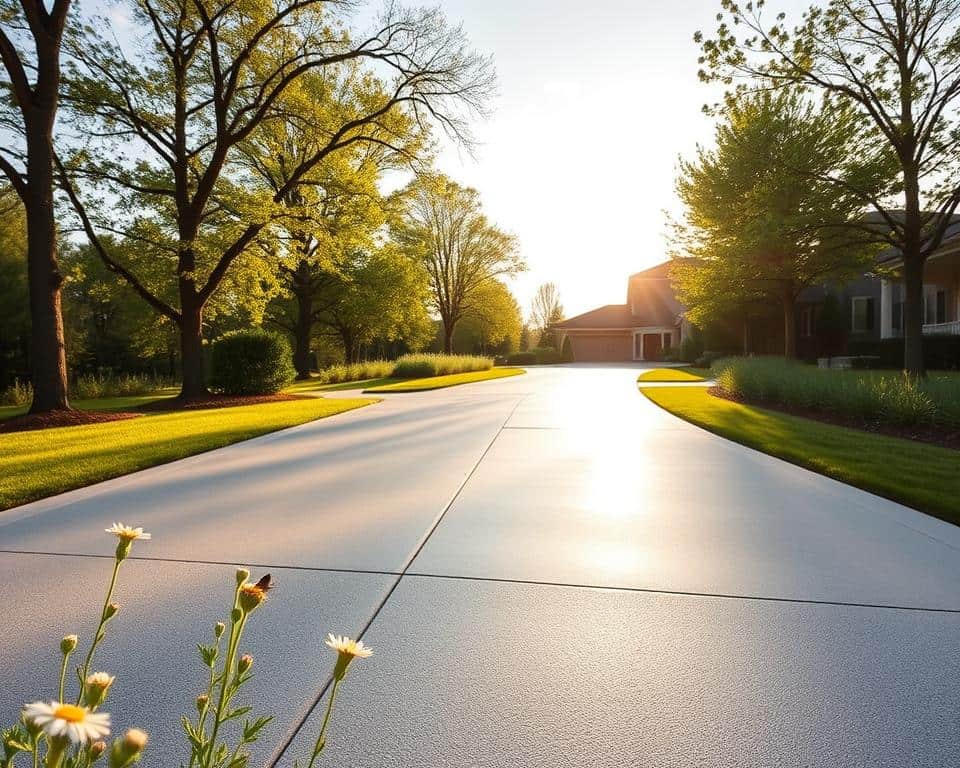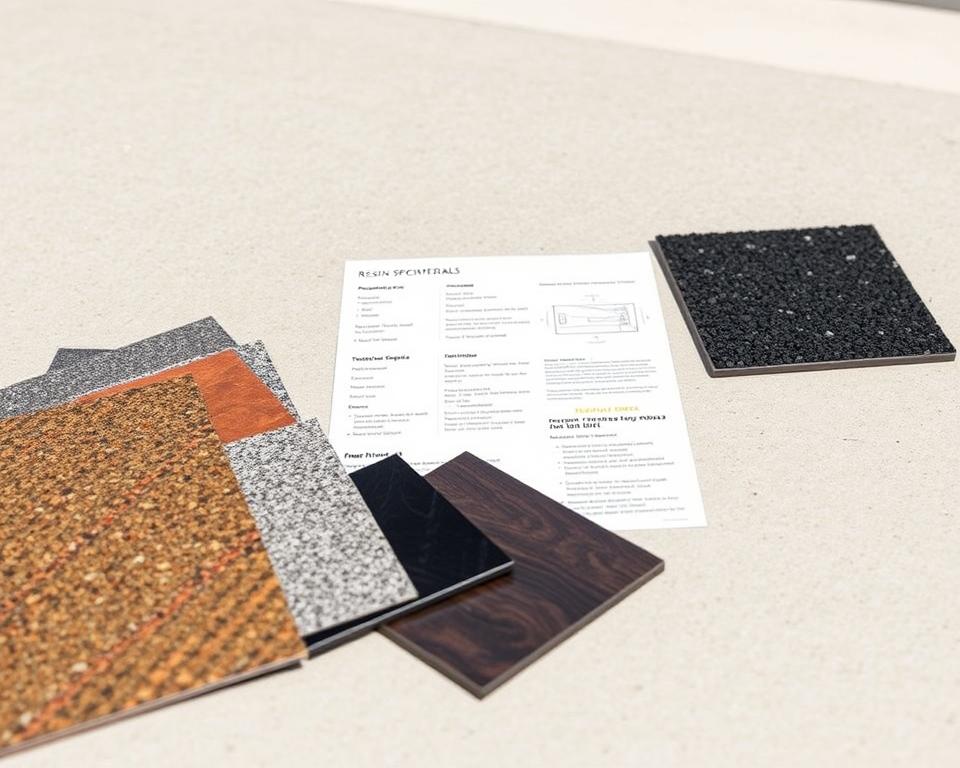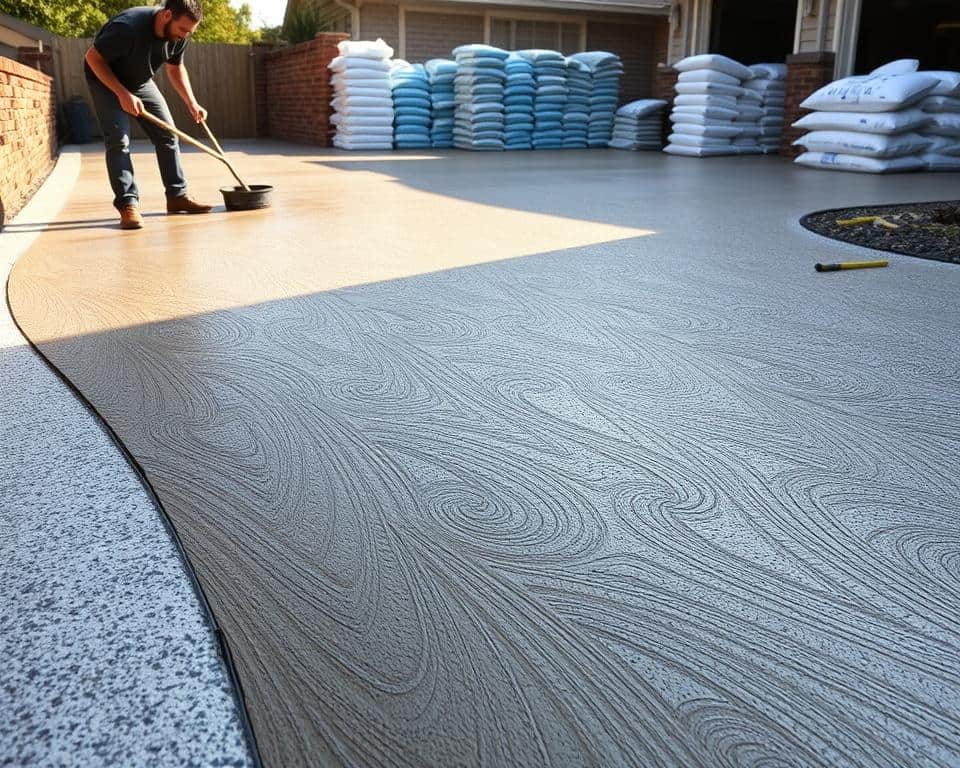Resin driveways are loved for their style and function. When buying resin driveway materials online, it’s key to look at a few important things. This ensures you get the best.
Finding the right resin driveway can seem hard. Knowing the difference between resin bound and resin bonded is a good start. Also, check the quality of materials and the supplier’s reliability. This will help you choose wisely.
Key Takeaways
- Understand the difference between resin bound and resin bonded systems.
- Consider the quality of driveway materials.
- Assess the reliability of the supplier.
- Check the durability and maintenance requirements.
- Evaluate the aesthetic appeal and customisation options.
Understanding Resin Driveways: Types and Applications
Choosing a resin driveway means knowing the types and uses. They are loved for being tough and looking good.
There are mainly two resin driveway types: Resin Bound and Resin Bonded. Knowing the difference helps pick the best one for you.
Resin Bound vs. Resin Bonded Systems
Resin Bound mixes aggregate with resin and applies it to a surface. This makes a smooth finish. It’s great for places needing SUDS (Sustainable Drainage Systems).
Resin Bonded spreads resin on the surface and adds aggregate on top. It’s faster and cheaper but less permeable than Resin Bound.
| System Type | Method | Permeability |
|---|---|---|
| Resin Bound | Mixing aggregate with resin | High |
| Resin Bonded | Applying resin and scattering aggregate | Low |
Suitable Base Materials for Resin Driveways
The base material is key for a resin driveway. It needs to be stable. Good bases include hardcore, concrete, and asphalt.
Hardcore is often chosen for its strength and drainage. Concrete and asphalt work too, if they’re in good shape.
Benefits of Choosing a Resin Driveway for Your Property
Choosing a resin driveway can really improve your property. They look great and offer many practical benefits. This makes them a popular choice for homeowners.
Aesthetic Advantages Over Traditional Surfaces
Resin driveways come in many designs. You can pick from different colours and textures. They match your property’s style perfectly.

Practical Benefits: Durability and Drainage
Resin driveways are not just pretty. They are also very durable and need little upkeep. They let rainwater drain through, which is good for places that get a lot of rain.
Essential Components of Quality Resin Driveway Materials
Quality resin driveway materials are key for a lasting and good-looking driveway. The resin and aggregate types greatly affect the driveway’s look and function.
Resin Types: Polyurethane vs. Epoxy
Choosing between polyurethane and epoxy resins depends on what you want from your driveway. Polyurethane is flexible and resists UV rays, perfect for outside use. Epoxy is strong and resists chemicals.
A study says, “the resin type you pick is key for a driveway’s durability and upkeep”.
Aggregate Options and Their Properties
Resin driveways use different aggregates like natural stone, recycled glass, and special ones. Each has its own benefits and looks.
Natural Stone Aggregates
Natural stone is loved for its toughness and beauty. It comes in many colours and textures, making it great for designs.
Recycled Glass and Specialty Aggregates
Recycled glass is eco-friendly, and special aggregates add unique looks. Your choice depends on what you want your driveway to look like and how it should perform.
Colour Stability and Fade Resistance
Keeping the driveway’s colour bright is important. Good resins and aggregates don’t fade or change colour easily.
| Aggregate Type | Durability | Aesthetic Appeal |
|---|---|---|
| Natural Stone | High | High |
| Recycled Glass | Medium | Medium |
| Specialty Aggregates | Varies | High |
Key Specifications to Check When Buying Resin Driveway Materials Online
When you buy resin driveway materials online, it’s key to look at the product details. This makes sure they fit what you need for your project. You should check a few important things that affect how well your driveway will last.
UV Stability and Weather Resistance Ratings
It’s important to see how well the resin driveway materials stand up to the sun and weather. High UV stability means they won’t fade or break down from sunlight. Look for ratings or certifications that show they can handle different weather.

Coverage Rates and Thickness Requirements
Knowing how much material you need is vital. The coverage rate tells you how much area one kilogram or litre will cover. Also, the thickness is key for a strong and lasting driveway.
Curing Times and Temperature Considerations
The time it takes for the resin to dry and the temperature it needs are important. Some products need a certain temperature to dry right. Knowing this helps plan your project better. It also helps you stick to your schedule.
Cost Analysis: Budgeting for Your Resin Driveway Project
Planning a resin driveway needs a clear look at all costs. Knowing these helps homeowners make smart choices and avoid surprises.
Price Comparison of Different Resin Systems
The price of resin driveway materials changes with the resin system. For example, resin bound systems cost more than resin bonded ones. This is because of better materials and a more complex setup.
| Resin System | Cost per m² | Characteristics |
|---|---|---|
| Resin Bound | £40-£60 | Durable, permeable, aesthetically pleasing |
| Resin Bonded | £20-£40 | Cost-effective, decorative, less durable than resin bound |
Additional Materials and Tools Required
More than just resin and aggregate are needed for a good job. You’ll also need primers, sealers, and special tools.
Primer and Sealer Costs
Primers and sealers keep your driveway looking good for years. They cost between £10 and £30, depending on the brand and quality.
Application Equipment Expenses
You’ll need special tools like mixers and trowels to apply the resin. The price of these tools can vary, but they’re a must for your budget.
Delivery Charges and Minimum Order Quantities
Delivery costs can add up, more so for big projects. Suppliers often have a minimum order. It’s key to know their delivery rules and order limits.
Experts say, “A good cost analysis is not just about the upfront cost. It’s about the long-term benefits and durability of your driveway.”
DIY vs. Professional Installation: Material Considerations
Choosing between DIY and professional installation for your resin driveway is important. It’s about the materials and the quality of the job. DIY kits can save money, but professional installation often gives better results.
Kits Designed for Homeowner Installation
DIY resin driveway kits are easy to use. They come with pre-measured resin and aggregate. But, the quality of the driveway depends on the installer’s skill and the materials.
Trade-Grade Materials and Their Advantages
Professionals use trade-grade materials for better quality and durability. These materials last longer and handle harsh weather well. Experts also ensure a great finish and proper drainage.
| Installation Method | Material Quality | Expertise Required |
|---|---|---|
| DIY Installation | Standard | Low-Moderate |
| Professional Installation | High | High |
Choosing between DIY and professional installation depends on the materials and job complexity. Many homeowners prefer a professional job for the best results.

Environmental and Regulatory Factors for Resin Driveways
The impact of driveways on the environment is a big worry. Resin driveways might be a green choice. The UK is trying to be more eco-friendly, and the building industry is too.
Resin driveways could help make things greener. They might follow SUDS rules and come in green versions.
SUDS Compliance and Permeable Solutions
Resin driveways are good for the planet because they let rainwater soak in. This helps follow SUDS rules, which are about handling rainwater better.
| SUDS Feature | Resin Driveway Benefit |
|---|---|
| Permeability | Reduces surface water runoff |
| Water Quality Improvement | Filters out pollutants from rainwater |
| Biodiversity Enhancement | Can be designed to incorporate green spaces |
Eco-Friendly Resin Options
Resin driveways can also be made with green resins. This makes them even better for the planet. Some makers use special resins that are better for the environment.
Choosing a resin driveway means picking the right resin and stone. These choices affect how green the driveway is.
Maintenance Products for Resin Driveways
Keeping your resin driveway in good shape is key. It makes your driveway look great and last longer. Regular care keeps it looking new and working well.
Cleaning Solutions and Equipment
Cleaning your driveway right is very important. The right cleaning solutions and tools help get rid of dirt and grime. These can harm your driveway if not removed.
Use cleaners made for resin surfaces. They won’t damage your driveway. A soft brush or a low-pressure washer works well without harming the surface.
Repair Kits and Touch-Up Materials
Even with regular cleaning, driveways can get damaged. Repair kits and touch-up materials can fix small problems. They have resin and aggregate that match your driveway.
Using the right maintenance products can make your driveway last longer. Make sure the products fit your driveway’s type.
Common Pitfalls When Purchasing Resin Driveway Materials Online
Buying resin driveway materials online can lead to mistakes. Knowing these pitfalls helps avoid costly errors. It’s important to be aware of these issues for a successful project.
Inadequate Quantity Calculations
One big mistake is not calculating the right amount of materials. To avoid this, carefully measure your driveway area. If unsure, get help from a professional.
Overlooking Essential Accessories and Tools
Not getting the right accessories and tools can slow you down. Always check what extra items you need for your resin driveway.
Misunderstanding Product Specifications
Not understanding product specs can cause problems. Always look at details like UV stability and weather resistance. This ensures your project meets its needs.
Making Your Final Decision: Checklist for Resin Driveway Purchases
When choosing resin driveways, having a checklist is key. It helps you think about all important things before buying online.
First, look at the material quality. This includes the resin and aggregate types. Then, think about what you need for installation, like base materials and tools. Remember, you’ll also need to clean and repair the driveway later.
Here’s a checklist to help you decide:
- Material quality and specifications
- Installation requirements and costs
- Maintenance needs and associated costs
- Supplier reputation and customer reviews
- Compliance with UK regulations and SUDS requirements
By using this checklist, you can make a smart choice. This ensures your resin driveway project goes well and meets your needs.

